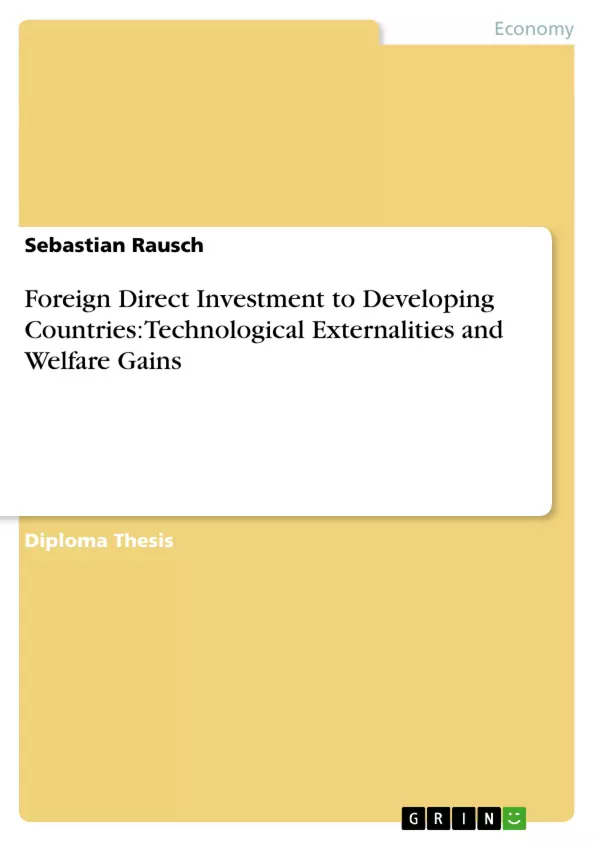This work analyzes under what conditions Foreign Direct Investment (FDI) flows to developing countries occur and what host country characteristics determine the extent of benefits associated with FDI. Using a numerical two-country general equilibrium model in which (vertical) FDI arise endogenously I compare welfare situations for the developing country before and after FDI liberalization. I specifically focus on the welfare potential of technological externalities arising from the activity of MNEs. These spillover effects stemming from the transfer of foreign technology and skills to local industries are shown to be welfare-improving if the host country, in particular local firms, possess the ability to absorb benefits from FDI.
Inhaltsverzeichnis (Table of Contents)
- 1 Introduction
- 2 Review of Literature
- 2.1 Theory about Foreign Direct Investment
- 2.2 Spillovers from Foreign Direct Investment and Absorptive Capacity
- 2.2.1 Theoretical Literature
- 2.2.2 Empirical Evidence
- 3 The Model
- 3.1 Model Description
- 3.1.1 Technology and Market Structure
- 3.1.2 Fixed Cost Assumptions
- 3.1.3 Specification for Technology Transfer
- 3.1.4 Consumption
- 3.2 Equilibrium Conditions
- 3.1 Model Description
- 4 Impact Effects and Partial Equilibrium Analysis
- 4.1 Factor Price Effects
- 4.2 A Simple Supply-Side Version of the Model
- 4.2.1 International Wage Differentials for Unskilled Labor
- 4.2.2 International Wage Differentials for Skilled Labor
- 4.2.3 Wage Differentials in a North-South Context
- 4.3 Trade Costs Effects and the Degree of Accessability of the Host Country
- 5 Numerical General Equilibrium Analysis
- 5.1 Calibration and Replication Check
- 5.2 Model without Spillover Effects (β = 0)
- 5.2.1 The Equilibrium Regime
- 5.2.2 Welfare Gains from FDI Liberalization
- 5.3 Model with Spillover Effects (β = 1)
- 5.3.1 The Role of Skilled Labor in the Absorption of FDI Spillovers
- 5.3.2 Technological Capacity of Domestic Firms
Zielsetzung und Themenschwerpunkte (Objectives and Key Themes)
This work aims to analyze the impact of foreign direct investment (FDI) on developing countries, focusing on the role of technological spillovers and their contribution to welfare gains. The study employs a general equilibrium model to assess the impact of FDI liberalization on various aspects of the host economy, including factor prices, trade costs, and technological capacity.
- Impact of FDI on developing countries
- Role of technological spillovers in FDI
- Welfare gains from FDI liberalization
- General equilibrium analysis of FDI
- Technological capacity and absorptive capacity in developing countries
Zusammenfassung der Kapitel (Chapter Summaries)
- Chapter 1 introduces the topic of FDI and its potential impact on developing countries. It highlights the importance of technological spillovers and their role in driving welfare gains.
- Chapter 2 provides a comprehensive review of the existing literature on FDI, focusing on theoretical frameworks and empirical evidence related to spillovers and absorptive capacity.
- Chapter 3 presents the model developed for this study, outlining its core assumptions, equations, and equilibrium conditions. It describes the mechanism of technology transfer and its impact on production and consumption.
- Chapter 4 analyzes the impact effects of FDI on factor prices, wages, and trade costs using partial equilibrium analysis. It examines the interplay between skilled and unskilled labor in the context of international wage differentials.
- Chapter 5 undertakes a numerical general equilibrium analysis, calibrating the model and exploring various scenarios with and without spillover effects. It investigates the role of skilled labor in absorbing FDI spillovers and assesses the overall welfare gains from FDI liberalization.
Schlüsselwörter (Keywords)
The main keywords and focus topics of this work include foreign direct investment, developing countries, technological spillovers, welfare gains, general equilibrium analysis, absorptive capacity, skilled labor, unskilled labor, trade costs, and FDI liberalization.
Frequently Asked Questions
What are technological spillovers in the context of FDI?
Technological spillovers refer to the unintended transfer of foreign technology, knowledge, and skills from multinational enterprises (MNEs) to local firms in the host country.
How does FDI affect welfare in developing countries?
FDI can improve welfare by increasing productivity through technology transfer, creating better-paying jobs for skilled labor, and enhancing the overall technological capacity of the host economy.
What is "absorptive capacity"?
Absorptive capacity is the ability of local firms and the host country's workforce to recognize, assimilate, and apply the advanced technology and knowledge brought in by foreign investors.
What determines the extent of benefits from FDI?
The benefits depend on host country characteristics such as the availability of skilled labor, the existing technological level of domestic firms, and the degree of trade liberalization.
What is the role of skilled labor in capturing FDI spillovers?
Skilled labor is crucial for the absorption of foreign technology; a higher presence of skilled workers increases the likelihood that a country will benefit from the presence of multinational corporations.
- Quote paper
- Sebastian Rausch (Author), 2005, Foreign Direct Investment to Developing Countries: Technological Externalities and Welfare Gains, Munich, GRIN Verlag, https://www.hausarbeiten.de/document/34573


